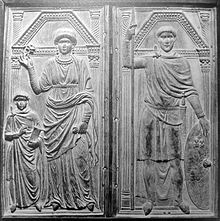Serena (wife of Stilicho)
| Serena | |
|---|---|
 Serena portrayed with her husband Stilicho and son Eucherius, c. 400 | |
| Born | before 379[1] |
| Died | 409 |
| Spouse | Stilicho |
| Issue | Eucherius Maria Thermantia |
| Dynasty | Theodosian |
| Father | Honorius[1] |
| Mother | Maria[1] |
Serena (died 409) was a Roman noblewoman of the Theodosian dynasty, niece of emperor Theodosius I and wife of the military commander Stilicho.
Family[edit]
Serena was the daughter of Honorius, the brother of Theodosius I and son of Theodosius the Elder, and her mother’s name is presumed to be Maria. She had an elder sister named Thermantia. Serena’s father died prior to 379, after which she was adopted by her uncle Theodosius.[1]
Around the year 384, she was married to the general Stilicho.[1] Although the poet Claudian stated that the union was arranged by Theodosius due to Stilicho’s military capability, opposing arguments contend that since Stilicho was hardly distinguished by the time of the marriage, it is more likely that Serena herself had chosen to marry the general.[2][3][4] The couple had a son, Eucherius, and 2 daughters, Maria and Thermantia, who would go on to be the first and second wives, respectively, of the emperor Honorius, Theodosius I’s son and Serena’s cousin.
Background[edit]
A resident at the court of Honorius, she selected a bride for Claudian, and took care of Honorius' half-sister Galla Placidia.
Zosimus records how Serena, a Christian, took a necklace from a statue of Rhea Silvia and placed it on her own neck. An old woman, the last of the Vestal Virgins, appeared, rebuking Serena and calling down punishment upon her for her act of impiety. Serena was then subject to dreadful dreams predicting her own untimely death.[5] Alan Cameron is sceptical of the entire tale, noting that Theodosius did not visit Rome in 394.
Stilicho was executed on Honorius' orders in 408, and Eucherius was also killed soon after. During the siege of Rome by the Visigoths the following year, Serena was falsely accused of conspiring with the Goths, and was executed with Galla Placidia's consent.
Notes[edit]
- ^ a b c d e Jones, Martindale & Morris, p. 824.
- ^ Cameron 1970, p. 56.
- ^ Hughes 2010, p. 15.
- ^ O’Flynn 1983, p. 16.
- ^ ""The New History", 5:38, Zosimus". Transcribed by Roger Pearse. Tertullian.org. Retrieved November 19, 2012.
{{cite web}}: CS1 maint: others (link)
Bibliography[edit]
- Cameron, Alan (1970). Claudian: Poetry and Propaganda at the Court of Honorius. Clarendon. ISBN 978-0-1981-4351-2.
- Hughes, Ian (2010). Stilicho: The Vandal Who Saved Rome. Barnsley: Pen & Sword Military. ISBN 978-1-84415-969-7.
- Jones, A.H.M.; J.R. Martindale & J. Morris (1971). Prosopography of the Later Roman Empire. Vol. 1. Cambridge University Press. ISBN 0-521-07233-6.
- O’Flynn, John M. (1983). Generalissimos of the Western Roman Empire. University of Alberta Press. ISBN 0-88864-031-5.
